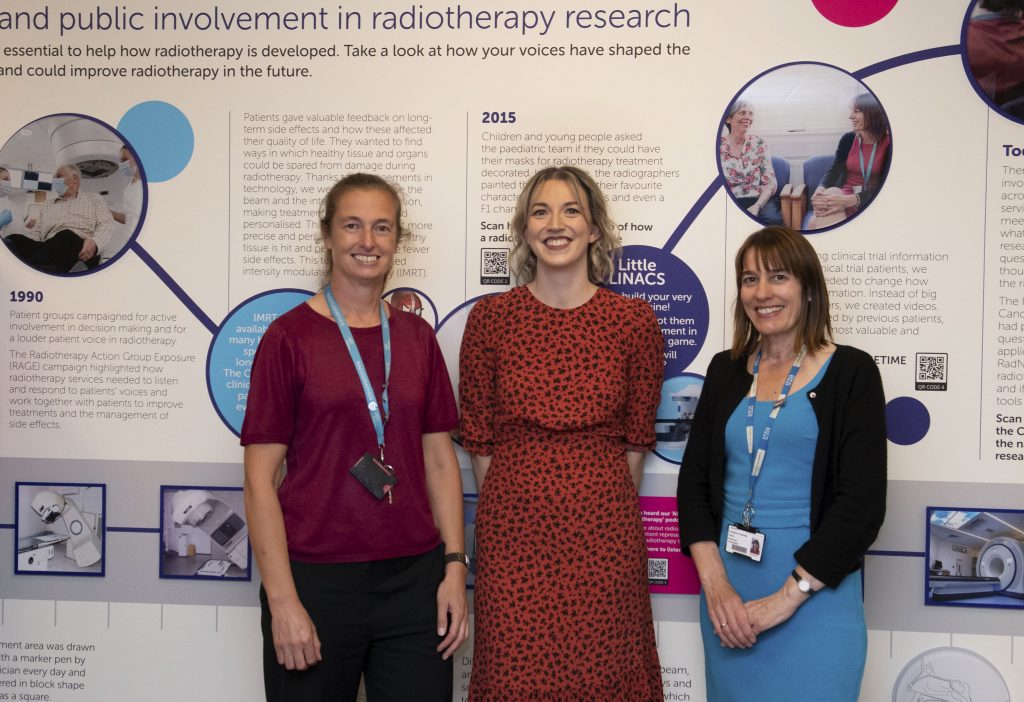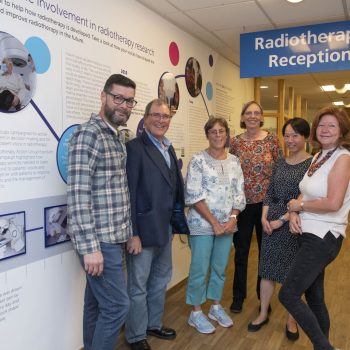Celebrating the role of patients in improving radiotherapy services
A new display in Addenbrooke’s Hospital highlights how patients have helped shape radiotherapy treatment.
The multimedia installation in the entrance to the Radiotherapy Department has been produced in partnership with a group of patients, some of whom have shared their experience of radiotherapy treatment.
In 2019 Cambridge was named by Cancer Research UK as one of seven centres of excellence in radiation research. When Rachael Webster, former Senior Radiographer at Addenbrooke’s, heard the good news, her mission was to include patients’ experience and views in the new RadNet Cambridge Centre’s plans to improve radiotherapy for future patients.
She said: “After a chat with one of our patient representatives we thought the best way to get more people involved in radiotherapy research is to celebrate the amazing work from patients and the public over many, many years that has helped shape the radiotherapy services we see today.”
The idea to develop a display about patient involvement in radiotherapy research began a year ago when Rachael put out adverts – at local events, online and via Facebook – inviting people who had experience of radiotherapy to be involved in a creative project.
Rachael soon assembled a group of nine patients and members of the public who were keen to be involved.

“Involving patients was the goal from the very beginning, we need to hear the patients’ voices to celebrate the patients’ voices,” she explained.
“There are a lot of misconceptions and fears about radiotherapy, especially from the past. We know radiotherapy is a safe, accurate and effective treatment for many cancers and around 50% of patients will received radiotherapy as a part of their treatment.”
Over the course of the year, the patient and public involvement group met with researchers, radiographers and designers to share the questions and concerns they had before they started their treatment, and to reflect on their honest experiences of undergoing radiotherapy.
People joined the group for different reasons. Neil said: “I wanted to be involved in the project so that I could help to promote the modern science of radiotherapy and how it can benefit patients.”
Beverly wanted to help others facing treatment, adding: “I feel more knowledgeable, more comfortable and I feel quite an advocate for helping people to feel the same. It was a way of giving something back that felt really important to me.”
And Caroline valued the opportunity to get involved, explaining: “Knowing that there was a way to make your voice heard and a way you can make a difference for other people was very empowering for me.”
The resulting display is based around a timeline illustrating how key advances in radiation research, patient participation in radiotherapy clinical trials and patient campaign groups have shaped the service today. Along the wall are QR codes for people to download podcasts and videos to hear more about radiotherapy techniques and the patients’ experiences.
The display also highlights pioneering radiotherapy research in Cambridge to target treatment more accurately and reduce long-term side effects that affect patients’ quality of life. A clinical trial in Cambridge of over a thousand patients proved the benefits of using a more targeted radiotherapy technique, called Intensity Modulated Radiotherapy (IMRT), for early-stage breast cancer and provided evidence to help IMRT become a standard of care.
Professor Charlotte Coles, RadNet Cambridge Lead and NIHR Cambridge BRC researcher, said: “I am thrilled to see this display showcasing the invaluable and essential contribution patients make by actively shaping as well as participating in radiotherapy research. I hope that conveying the incredible advances in radiotherapy research in such an accessible and relatable way will give patients and families added confidence in their radiotherapy and inspire them to get involved in research.”
The RadNet Cambridge team are keen to involve more patients, particularly those in under-represented groups, to share their experiences and to guide future research projects and clinical trials. Amy, one of the patients in the group, said: “My message to those who are approached to participate in a project like this, or to participate in some of these research projects, is that we need to be in it to influence it.”
The project has been funded by Addenbrooke’s Charitable Trust with additional funding and support from RadNet Cambridge and the Cancer Research UK Cambridge Centre.



